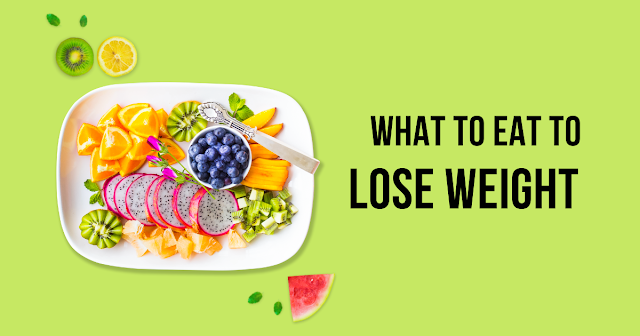What to Eat to Lose Weight: The Basics
When it comes to weight loss, the key is to create a calorie deficit. This means that you need to burn more calories than you consume. There are two ways to do this: by increasing your physical activity or by reducing your caloric intake. The most effective weight loss plans combine both approaches.
Calories: How Many Do You Need?
Before you can start cutting calories, you need to know how many calories you need to maintain your weight. This number is based on your age, gender, weight, height, and activity level. You can use an online calculator to estimate your daily caloric needs.
What to Eat to Lose Weight: The Best Foods
Now that you know how many calories you need, it's time to focus on the types of foods that can help you achieve your goals. Here are some of the best foods to eat when trying to lose weight:
1. Vegetables
Vegetables are low in calories and high in fiber, which makes them a great choice for weight loss. They also contain a wide range of nutrients that are essential for good health. Some of the best vegetables to include in your diet include:
- Broccoli
- Spinach
- Kale
- Cauliflower
- Brussels sprouts
2. Fruits
Like vegetables, fruits are low in calories and high in fiber. They're also rich in vitamins and minerals. Some of the best fruits to eat when trying to lose weight include:- Apples
- Berries (such as strawberries, blueberries, and raspberries)
- Oranges
- Grapefruits
- Bananas (in moderation)
3. Lean Protein
Protein is an important nutrient that can help you feel full and satisfied. It also helps build and repair muscles. Some of the best sources of lean protein include:
- Chicken breast
- Turkey breast
- Fish (such as salmon, tuna, and cod)
- Lean beef (such as sirloin and tenderloin)
- Legumes (such as beans, lentils, and chickpeas)
4. Whole Grains
Whole grains are a great source of fiber, which can help you feel full and satisfied. They also contain a wide range of nutrients, including vitamins, minerals, and antioxidants. Some of the best whole grains to include in your diet include:- Brown rice
- Quinoa
- Oats
- Barley
- Whole wheat bread
What to Avoid When Trying to Lose Weight
In addition to focusing on healthy foods, it's also important to avoid certain foods and drinks when trying to lose weight. Here are some of the things you should avoid:1. Sugary Drinks
Sugary drinks are high in calories and can contribute to weight gain. This includes soda, sports drinks, and fruit juices. Instead, opt for water or unsweetened beverages.
Sugary drinks are high in calories and can contribute to weight gain. This includes soda, sports drinks, and fruit juices. Instead, opt for water or unsweetened beverages.
2. Processed Foods
Processed foods are often high in calories, sugar, and salt. They're also low in nutrients. Instead, focus on whole, unprocessed foods.
Processed foods are often high in calories, sugar, and salt. They're also low in nutrients. Instead, focus on whole, unprocessed foods.
3. Fried Foods
Fried foods are often high in calories and unhealthy fats.
Fried foods are often high in calories and unhealthy fats.
Tips and Tricks for Making Healthy Choices
Making healthy choices can be challenging, especially when you're busy or on the go. Here are some tips and tricks for making healthy choices:
1. Plan Ahead
Planning your meals ahead of time can help you make healthier choices. Try to prepare your meals and snacks for the week on Sunday, so you have healthy options on hand throughout the week.
Planning your meals ahead of time can help you make healthier choices. Try to prepare your meals and snacks for the week on Sunday, so you have healthy options on hand throughout the week.
2. Keep Healthy Snacks on Hand
When you're hungry and in a hurry, it can be tempting to reach for a bag of chips or a candy bar. To avoid this, keep healthy snacks on hand, such as fruit, nuts, or cut-up vegetables.
When you're hungry and in a hurry, it can be tempting to reach for a bag of chips or a candy bar. To avoid this, keep healthy snacks on hand, such as fruit, nuts, or cut-up vegetables.
3. Read Labels
Reading food labels can help you make informed decisions about what you're eating. Look for foods that are low in calories, sugar, and saturated fat, and high in fiber and protein.
Reading food labels can help you make informed decisions about what you're eating. Look for foods that are low in calories, sugar, and saturated fat, and high in fiber and protein.
4. Practice Portion Control
Eating too much, even of healthy foods, can lead to weight gain. To avoid this, practice portion control by using smaller plates and measuring your food.
Eating too much, even of healthy foods, can lead to weight gain. To avoid this, practice portion control by using smaller plates and measuring your food.
What to Eat to Lose Weight: FAQs
1. Is it necessary to count calories when trying to lose weight?While counting calories can be helpful for some people, it's not necessary for everyone. The most important thing is to create a calorie deficit by burning more calories than you consume.
2. Can I eat carbs when trying to lose weight?
Yes, you can eat carbs when trying to lose weight. However, it's important to focus on complex carbs, such as whole grains, rather than simple carbs, such as sugary snacks.
Yes, you can eat carbs when trying to lose weight. However, it's important to focus on complex carbs, such as whole grains, rather than simple carbs, such as sugary snacks.
3. Can I eat snacks when trying to lose weight?
Yes, you can eat snacks when trying to lose weight. However, it's important to choose healthy snacks, such as fruit, nuts, or cut-up vegetables, rather than sugary snacks.
Yes, you can eat snacks when trying to lose weight. However, it's important to choose healthy snacks, such as fruit, nuts, or cut-up vegetables, rather than sugary snacks.
4. How much protein do I need when trying to lose weight?
The amount of protein you need when trying to lose weight depends on your weight, gender, and activity level. As a general rule, aim to consume 0.36 grams of protein per pound of body weight per day.
The amount of protein you need when trying to lose weight depends on your weight, gender, and activity level. As a general rule, aim to consume 0.36 grams of protein per pound of body weight per day.
5. Can I eat out when trying to lose weight?
Yes, you can eat out when trying to lose weight. However, it's important to choose healthy options, such as grilled chicken or fish, and to watch your portion sizes.
Yes, you can eat out when trying to lose weight. However, it's important to choose healthy options, such as grilled chicken or fish, and to watch your portion sizes.
6. Can I drink alcohol when trying to lose weight?
Alcohol can be high in calories and can contribute to weight gain. While it's okay to enjoy a drink occasionally, it's best to limit your alcohol consumption when trying to lose weight.
Alcohol can be high in calories and can contribute to weight gain. While it's okay to enjoy a drink occasionally, it's best to limit your alcohol consumption when trying to lose weight.
Conclusion
Losing weight can be challenging, but it's not impossible. By focusing on healthy foods, making smart choices, and staying active, you can achieve your weight loss goals. Remember, there are no magic foods or quick fixes. It takes time and effort to create a healthy lifestyle that works for you.So, if you're wondering what to eat to lose weight, focus on whole, unprocessed foods, such as vegetables, fruits, lean protein, and whole grains. Avoid sugary drinks, processed foods, and fried foods. And don't forget to make healthy choices, even when you're on the go.
Remember, the most important thing is to be patient and consistent. With time and effort, you can achieve your weight loss goals and enjoy a healthier, happier life.






0 Comments